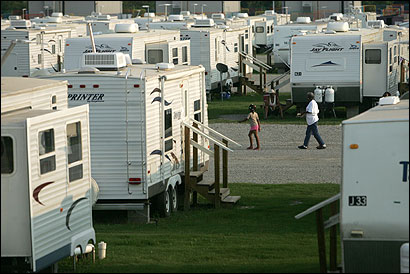Now, the cities where people landed have come to the end of their patience and hospitality. Residents are being told to "move forward or get out."
Gulf Coast communities are moving to banish the FEMA issued trailers. They are shutting down the impromptu settlements, and telling homeowners who are living in the trailers on their own property while they fight insurance companies and struggle to rebuild and repair storm-damaged homes that they must be making tangible progress toward the restoration of their homes or get rid of the white travel trailers that dot homesteads from Texas to Alabama.
 The Mayor of Pascagoula, Miss., Matthew Avara says "It's an act of tough love. We don't want to put any unneeded hardship on any of our people, but at the same time, we've got to move forward, and the way to move forward is to close down these parks."
The Mayor of Pascagoula, Miss., Matthew Avara says "It's an act of tough love. We don't want to put any unneeded hardship on any of our people, but at the same time, we've got to move forward, and the way to move forward is to close down these parks."Attorneys representing the displaced said the local ordinances leave the occupants with few, if any, alternatives. Affordable housing is in short supply in the areas hardest hit by the storms. "Throwing people out when they have no place else to live is not a long-term solution for a community," says Davida Finger, a lawyer with Loyola University's Law Clinic, which has represented trailer occupants fighting attempts to remove them. "Some of my clients have been made homeless." Ms. Filger could not say how many of the trailers had been removed under the hodgepodge of local restrictions.

The FEMA trailer is the most ubiquitous symbol of the bungled post-Katrina recovery effort. Small and cramped, unsound, and contaminated with formaldehyde. Some of the tiny little travel-trailers are home to six, eight, even ten people.
In the aftermath of Hurricane Katrina, FEMA spent $1.8 Billion on the trailers to provide temporary shelter. In the past, when hurricanes have hit Florida and the Carolinas, the trailers were a good option. They provided shelter while homes and lives were rebuilt. The storms that hit New Orleans hit a different population. Many of the displaced didn't own their homes, so the land their homes sat on was not theirs to park a trailer on, nor was the home theirs to repair. These people were shunted into temporary trailer parks, like the ironically-named Renaisance Village in Baker, LA (pictured above). For the people in the FEMA trailer parks, minutes pass like hours, and hours pass like days.
Local officials wanting to get rid of the Katrinaville trailer parks cite complaints of crime in the trailer parks as a reason, but also point out that the trailers are not structurally sound, that they are unsafe in bad weather. They also maintain that the trailers stand in the way of recovery. "In time, we have to get normalcy back, and what we were concerned with was the amount of trailers and the people who were planning to stay in trailers for the rest of their life," says D.J. Mumphrey, who has handled trailer removal issues for Jefferson Parish, LA - just outside New Orleans. Jefferson Parish (which is not home to a Katrinaville) will be sending inspectors to the trailers still sheltering residents of the parish in November, to verify that trailer occupants are on their own land and making progress toward repairing and restoring their homes. The parish claims it will grant extensions for people still fighting their insurance companies or waiting on rebuilding aid.
And that last bit there sets me off all over again. What the hell? Two years on and people are still at odds with insurance companies??? I see a need for congressional hearings about that.
Katrina is the metaphor for the failures of the Bush administration. A president who partied while an American city drowned. Her people abandoned to their own devices. The state's National Guard deployed; and their deep-water vehicles in Iraq.
Now many of those people who were abandoned to the storm, people who lost everything and have no way of regaining any of it, are facing homelessness as the localities where they were settled legislate the only shelter they have access to out of existence.


No comments:
Post a Comment